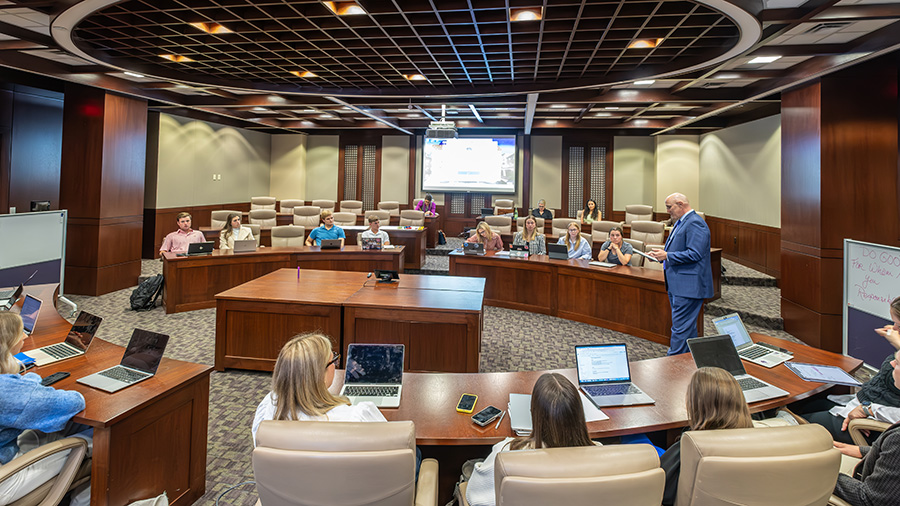
How easy is it to give away $100,000? A TCU class in philanthropy finds out.
By Scott Nishimura
Photography by Olaf Growald
It’s 2:42 a.m., and the 18 students in Ron Pitcock’s “Nature of Giving” Honors College class at TCU have just completed $100,000 in grants for five nonprofit organizations after nearly 11 hours of final discussion in the Debate Chamber at the university’s otherwise-empty Scharbauer Hall. Good thing: much later, and the group — already treated by Pitcock to pizza and salad and a cookie break — might have been in for pancakes.
“At some point, you’ve got to give or we’re going to be going to Ol’ South for breakfast,” Pitcock pleaded sometime after the group decided at 11:50 p.m. on its first gift, $30,000 to the Dash Network, a local nonprofit that helps refugees and needed to buy a van.
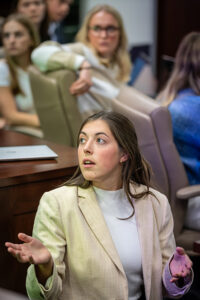
During the final debate, TCU honors students discuss the pros and cons of 15 finalist nonprofits before beginning to decide which organizations to grant gifts.
That gift came nearly eight hours into the final discussion and after a semester in which the students nominated more than 75 nonprofits, analyzed them and shared insights with each other, paid site visits and, finally, narrowed the group to the 15 they brought into the Debate Chamber April 29. The students’ struggle epitomized what Pitcock wanted them to understand: If raising money is difficult (the students didn’t do that; the Fort Worth philanthropists Kelly and Jeff Dillard gave the $100,000 to the class), what about giving it away?
“It’s incredibly difficult to do,” Pitcock tells the group shortly before the students voted yes to give Dash Network money for the van.
The students wrestled all night with weighty questions that at times seemed in conflict with each other. Can we really help a large organization? Can we have a bigger impact if we write a big check to a smaller one? Is a smaller organization reliable? Is its program sustainable? Are the mission, need and what the gift will be spent on clear?
Besides Dash Network, Pitcock’s class also gave $25,000 to Girls Inc., which provides programs that foster independent women; $20,000 to Taste Project, a nonprofit restaurant that allows patrons to pay what they can; $10,000 to The WARM Place, a grief support center for children; and, finally, $15,000 to Hope Farm, an organization that supports at-risk boys.
“You just gave away $100,000 and lives are going to be changed and they’re asleep right now,” Pitcock told the exhausted students.
TCU started the class in 2011, with Pitcock — now dean of the university’s John V. Roach Honors College — at the helm, after the idea bubbled up from a Fort Worth philanthropist who was interested in whether it was possible to construct a university class that taught students how to lead thoughtful giving lives and give fully from time, treasure and talent. Other universities nationally have since replicated the idea.
Pitcock’s first class gave away $25,000. The class — offered once a year — has now given away about $1.4 million, Pitcock said in an interview. And for the 2024 spring semester, the Honors College added a second section taught simultaneously by a different professor that also granted $100,000 given by donors.
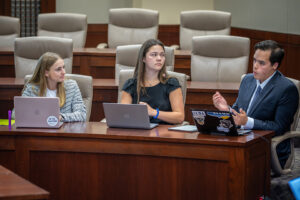 “The questions I get from the kids are probably harder than I get from our other grant-making organizations,” Victor Neil, vice president of marketing and development for Hope Farm, which also received a $30,000 grant from the second class, said in an interview. “Some of the questions really make us explain how we do things around here.”
“The questions I get from the kids are probably harder than I get from our other grant-making organizations,” Victor Neil, vice president of marketing and development for Hope Farm, which also received a $30,000 grant from the second class, said in an interview. “Some of the questions really make us explain how we do things around here.”
Neil participated in inquiries during the semester from both classes and helped run site visits for students representing the two groups. It’s the fourth time Hope Farm has been in the running during his seven years at Hope Farm, and the second year the organization won a grant. This year, his was one of two organizations that received gifts from both classes. “I feel really fortunate,” Neil said.
The Dillards — Jeff Dillard is founding principal of the Tailwind Advisors family office in Fort Worth and president of Cobra Oil & Gas Corp. in Wichita Falls — became involved in Pitcock’s class several years ago through a connection to a former student.
The Dillards — University of Texas graduates whose children have attended TCU — focus their giving on causes that support children and education. They also layer in their Christian faith, an interest shared by some number of the students who take the class. In Fort Worth, the Dillards give regularly to organizations such as Cook Children’s, Fort Worth Zoo, All Saints’ Episcopal School and TCU and its KinderFrogs School.
“We want it to make a difference,” Jeff Dillard said in an interview with his wife. “What we try to do is write larger checks that we know are going to make a difference in an organization.”
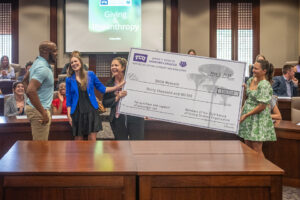
The couple earlier made a 10-year commitment to give to the TCU program that began with this year’s two classes. “We’ll continue to do this as long as they’ll have us,” Kelly Dillard said in the interview. “It’s really educational for us.”
Giving by committee was never intended to be a pretty process — a two-thirds vote of class members was required to make a gift — but it’s made more difficult from year to year by the fact that each new class develops its own values, social return on investment criteria, and approach to the final debate and decision-making. The only consistent requirements: the class can give to no more than five nonprofits, and all must have 501c(3) status. The organizations do not have to be locally based to receive a gift.
“The beauty of this class is that we end up with business majors learning alongside social work majors, learning alongside philosophy majors, learning alongside economics majors and political science majors and education majors,” Pitcock said. This mix guarantees a range of perspectives in every class, he said.
The second class also gave $10,000 to Families to Freedom, which provides transportation to victims of domestic violence; $20,000 to One Safe Place, which provides free support services to people who have experienced abuse, violence or trafficking; $20,000 to Taste Project; and $20,000 to Innocence Project of Texas, which works to free the wrongfully convicted.
“It’s an example of how two different groups, two different foundations, can approach giving from two different values,” Pitcock said.
He sets the tone for his class by giving each student $10 before the first day, with the simple message “Do Good.” It’s up to them what to do with the money.
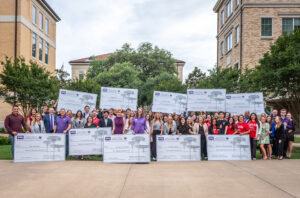
Students from the two TCU Honors College spring philanthropy classes met May 1 to present their gifts to eight nonprofits. Photo courtesy of Ron Pitcock
Pitcock’s class narrowed its original nominees to 35 and, finally, 15 during the semester. The class split into groups for site visits and generated hundreds of pages of analysis. A number of the students had personal connections to nonprofits, but had to surrender those emotional connections if it became apparent those organizations weren’t going to move on in the voting. During the first narrowing, to 35, “a lot of people had started to let go of their personal ties,” Lauren Grace Perry, a graduating marketing major from Little Rock who is moving to Dallas for a job with the Bain & Co. consultancy, said in an interview with two classmates.
The students also had to decide how much of their personal experiences and perspectives they wanted to share. “How vulnerable do I become?” said Autumn Rae Henry, a graduating senior who wants to start a substance abuse recovery center for adolescent boys.
The students steered toward organizations that serve people, but also moved away from large health care entities that had been nominated.
“A $25,000 donation is just a drop in the bucket” for those organizations, Jackson Donaldson, one of the students and a graduating marketing major who is moving to Seattle for a job with Microsoft, said.
The class helped the students expand on what a number of them experienced growing up.
“My family talked about where we gave,” said Donaldson, who attended high school in Kansas City and South Carolina. “I went to camp, we always gave to camp. We always give to our church.” Donaldson said he feels he’ll always give financially. “That feels non-negotiable.” But he also wants to give of his time and talent. “I want to give in different ways.”
